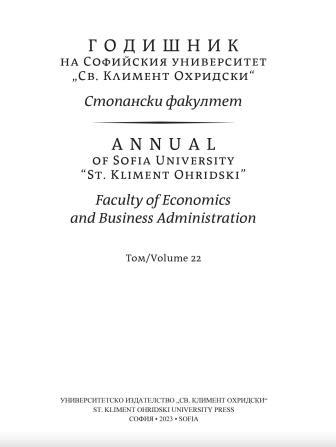ПЪТЯТ КЪМ НЕПЛАТЕЖОСПОСОБНОСТТА НА ГЪРЦИЯ ПО НЕЙНИЯ ДЪРЖАВЕН ДЪЛГ ПРЕЗ МАЙ 2010 Г.: ПРИЧИНИ, ХИПОТЕЗИ И ИНСТИТУЦИОНАЛНИ ОСНОВИ
THE PATH TO GREECE’S DEFAULT ON ITS GOVERNMENT DEBT IN MAY 2010: CAUSES, HYPOTHESES AND INSTITUTIONAL BACKGROUND
Author(s): Mikhail RaevSubject(s): Economy, National Economy, Public Finances, Socio-Economic Research
Published by: Софийски университет »Св. Климент Охридски«
Keywords: Greek Sovereign Debt Crisis 2009-2010; institutional rules and constraints
Summary/Abstract: The paper aims to contribute to the research concerning the causes of the Greek Sovereign Debt Crisis that unrolled in 2010. It started in October 2009 as a reputational crisis about whether the Greek Government would be able to pay back or refinance its debt in 2010. Scholars pay emphasis on various macroeconomic disbalances of the Greek economy, such as worsened fiscal sustainability,mass tax evasion, generous pension and social security system, enormous state administration, and misapplication of Greek and European Union subsidies to support private consumption instead of business investment. Several studies outline labour market rigidities that had adversely affected the competitiveness of the Greek economy. The paper steps upon the theoretical framework of institutional economics and the theory of political and social elites. The author highlights Greek politicians’ institutionalised mode of behaviour to negotiate all major country deals tête-à-tête with their foreign counterparts since the 1970s. In this way, they counterbalanced the government’s deficiencies, such as the absence of administrative capacity or poor intergovernmental coordination. The second contribution of this paper explains the reluctance of the Greek state regarding the quick decrease of the deficit in the 2010 budget. The author suggests that the numerous interconnections between PASOK and Νέα Δημοκρατία with major industry associations and trade unions might have composed informal constraints to any significant institutional change. Thus, a sharp decrease in social welfare, pensions and state administrative expenses would have had a damaging effect on the political elite and electoral results.
Journal: Годишник на Стопанския факултет на СУ „Св. Климент Охридски“
- Issue Year: 22/2023
- Issue No: 1
- Page Range: 125-150
- Page Count: 26
- Language: Bulgarian

